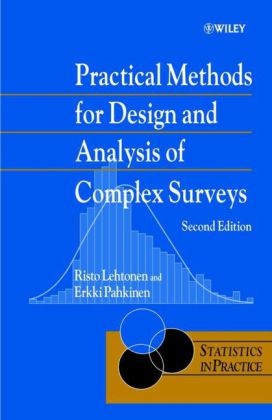Read more
Informationen zum Autor Risto Lehtonen and Erkki Pahkinen are the authors of Practical Methods for Design and Analysis of Complex Surveys, 2nd Edition, published by Wiley. Klappentext Large surveys are becoming increasingly available for public use, and researchers are often faced with the need to analyse complex survey data to address key scientific issues. For proper analysis it is also important to be aware of the different aspects of the design of complex surveys. Practical Methods for Design and Analysis of Complex Surveys features intermediate and advanced statistical techniques for use in designing and analysing complex surveys. This extensively updated edition features much new material, and detailed practical exercises with links to a Web site, helping instructors and enabling use for distance learning. Provides a comprehensive introduction to sampling and estimation in descriptive surveys, including design effect statistic and use of auxiliary data. Includes detailed coverage of complex survey analysis, including design-based ANOVA and logistic regression with GEE estimation. Contains much new material, including handling of non-sampling errors, and model-assisted estimation for domains. Features detailed real-li fe case studies, such as multilevel modeling in a multinational educational survey. Supported by a Web site containing software codes, real data sets, computerized exercises with solutions, and online training materials. Practical Methods for Design and Analysis of Complex Surveys provides a useful practical resource for researchers and practitioners working in the planning, implementation or analysis of complex surveys and opinion polls, including business, educational, health, social, and socio-economic surveys and official statistics. In addition, the book is well suited for use on intermediate and advanced courses in survey sampling. Statistical complex survey analysis is a means to analyse the results, and gain information about a large population based on a complex survey of a sample of that population. A complex survey is a sample survey that divides the population into subgroups and collecting information from clusters within each subgroup and combining the results. Inhaltsverzeichnis Preface. 1. Introduction. 2. Basic Sampling Techniques. 2.1 Basic definitions. 2.2 The Province'91 population. 2.3 Simple random sampling and design effect. 2.4 Systematic sampling and intra-class correlation. 2.5 Selection with probability proportional to size. 3. Further Use of Auxiliary Information. 3.1 Stratified sampling. 3.2 Cluster sampling. 3.3 Model-assisted estimation. 3.4 Efficiency comparison using design effects. 4. Handling Nonsampling Errors. 4.1 Reweighting. 4.2 Imputation. 4.3 Chapter summary and further reading. 5. Linearization and Sample Reuse in Variance Estimation. 5.1 The Mini-Finland Health Survey. 5.2 Ratio estimators. 5.3 Linearization method. 5.4 Sample reuse methods. 5.5 Comparison of variance estimators. 5.6 The Occupational Health C are Survey. 5.7 Linearization method for covariance-matrix estimation. 5.8 Chapter summary and further reading. 6. Model-assisted Estimation for Domains. 6.1 Framework for domain estimation. 6.2 Estimator type and model choice. 6.3 Construction of estimators and model specification. 6.4 Further comparison of estimators. 6.5 Chapter summary and further reading. 7. Analysis of One-way and Two-way Tables. 7.1 Introductory example. 7.2 Simple goodness-of-fit test. 7.3 Preliminaries for tests for two-way tables. 7.4 Test of homogeneity. 7.5 Test of independence. 7.6 Chapter summary and further...

